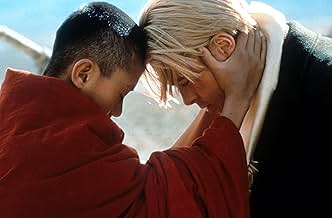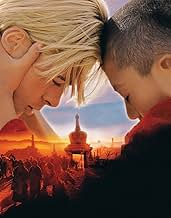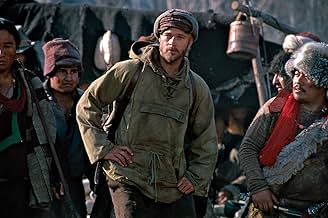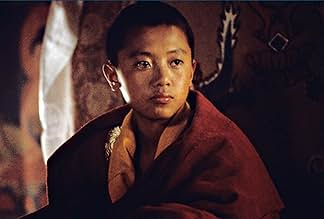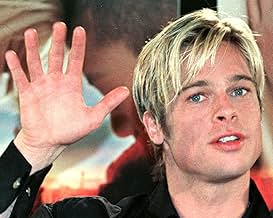ऑस्ट्रियाई पर्वतारोही हेनरिक हैरर की सच्ची कहानी, जो चीन के तिब्बत के अधिग्रहण के समय दलाई लामा के साथ दोस्त बन गए.ऑस्ट्रियाई पर्वतारोही हेनरिक हैरर की सच्ची कहानी, जो चीन के तिब्बत के अधिग्रहण के समय दलाई लामा के साथ दोस्त बन गए.ऑस्ट्रियाई पर्वतारोही हेनरिक हैरर की सच्ची कहानी, जो चीन के तिब्बत के अधिग्रहण के समय दलाई लामा के साथ दोस्त बन गए.
- पुरस्कार
- 3 जीत और कुल 8 नामांकन
BD Wong
- Ngawang Jigme
- (as B.D. Wong)
Ngawang Chojor
- Lord Chamberlain
- (as Ven. Ngawang Chojor)
फ़ीचर्ड समीक्षाएं
First of all, Seven Years In Tibet is a very aesthetically pleasing film. The snowy Himalayas, the Tibetan villages, and the amazing costumes and religious ceremonies are all filmed beautifully, with rich colours and lighting. The music by John Williams is also excellent, and it's fascinating to hear how it blends with the unusual Tibetan music.
It's not all surface though, there's depth here too. Don't believe the negative comments about Brad Pitt's acting. Admittedly his accent slips a bit in places, but he does a great job as Heinrich, both the unpleasant, arrogant character at the beginning, and the more gentle and wise man that he becomes as the film progresses. His relationship with the young Dalai Lama (a very impressive actor) is an unusual one and refreshingly unsentimental. The film is well edited; scenes are not drawn out any longer than they need to be. As a whole, it is fast paced but also peaceful, tender and moving. You don't get bored but you're not bombarded with pointless action scenes either.
It's a pleasant surprise to see a Hollywood film where women and other cultures aren't treated as objects, and are allowed to be full, complex characters. It could be argued that this film has a Western perspective, but after all, it is adapted from a book written by a European living in Tibet, and intended for Western audiences. It treats the Tibetan culture with a great deal of respect, so I don't really see a problem with that. Similarly, those who have complained that it doesn't tell you enough about the Dalai Lama and too much about Heinrich, ultimately it is Heinrich's story, and that is its strength: that it is one man's tale, and not a political polemic. It gives you a great sense of how people's stories intersect and how the whole world is connected.
Overall, an unusual film, very involving and emotional without sentimentality, with wonderful music and outstanding cinematography. Highly recommended.
It's not all surface though, there's depth here too. Don't believe the negative comments about Brad Pitt's acting. Admittedly his accent slips a bit in places, but he does a great job as Heinrich, both the unpleasant, arrogant character at the beginning, and the more gentle and wise man that he becomes as the film progresses. His relationship with the young Dalai Lama (a very impressive actor) is an unusual one and refreshingly unsentimental. The film is well edited; scenes are not drawn out any longer than they need to be. As a whole, it is fast paced but also peaceful, tender and moving. You don't get bored but you're not bombarded with pointless action scenes either.
It's a pleasant surprise to see a Hollywood film where women and other cultures aren't treated as objects, and are allowed to be full, complex characters. It could be argued that this film has a Western perspective, but after all, it is adapted from a book written by a European living in Tibet, and intended for Western audiences. It treats the Tibetan culture with a great deal of respect, so I don't really see a problem with that. Similarly, those who have complained that it doesn't tell you enough about the Dalai Lama and too much about Heinrich, ultimately it is Heinrich's story, and that is its strength: that it is one man's tale, and not a political polemic. It gives you a great sense of how people's stories intersect and how the whole world is connected.
Overall, an unusual film, very involving and emotional without sentimentality, with wonderful music and outstanding cinematography. Highly recommended.
"Seven Years in Tibet" was a pleasant surprise. Sporting an Austrian accent that got slammed by some critics, I thought Brad Pitt was pretty good as an arrogant Nazi who finds himself captured by the British during a failed expedition to the Himalayas and is later stranded in Tibet after escaping from a POW camp. He finds his humanity in the forbidden-to-foreigners city of Lhasa, especially after meeting the 14 year old Dalai Lama. Echoes of "Lost Horizon," "The King and I" "Last Emperor" and others abound, but the movie is "old Hollywood" in the best sense with magnificent scenery (widescreen advised: the mountains and countryside of Argentina and Canada stand in for Tibet). The heart of the movie is the relationship between the blond Aryan golden boy and the young "Kundun," with a performance by the young Tibetan actor playing the latter that is so charming he nearly steals the whole film. An engrossing blend of fact and fiction, the picture manages to avoid condescending to the Tibetans and over-reverent preachiness. Wrapped in an excellent production, this epic story makes entertaining viewing. One question: how did the young Dalai Lama come by his love of movies in that remote location?
I missed this film the fist time around and saw it for the first time last night on DVD. I was pleasantly surprised. It seemed to me that some extraordinary effort went into creating an accurate portrayal of the forbidden city of Lhasa, and the lives and culture of the Tibetans who are at the core of the movie.
On the acting side, Brad Pitt was not quite totally believable as a German but, accent-quibbles aside, he did inhabit the character in a way that was compelling and interesting. I thought the supporting cast of Mako and (mostly) Tibetan unknowns was good and the use of these unknowns added credibility to the movie.
The scenery was as beautiful as you would expect it to be -- breathtaking shots of the Himalayas dominating throughout much of the movie.
On the acting side, Brad Pitt was not quite totally believable as a German but, accent-quibbles aside, he did inhabit the character in a way that was compelling and interesting. I thought the supporting cast of Mako and (mostly) Tibetan unknowns was good and the use of these unknowns added credibility to the movie.
The scenery was as beautiful as you would expect it to be -- breathtaking shots of the Himalayas dominating throughout much of the movie.
Tibet has certainly fascinated people all over the world. The hidden land in the most forbidding place on the planet not at either pole. In its day Lost Horrizon made quite a bit of money for its author James Hilton. But the real story of Heinrich Harrer is better than anything a fictional author could have thought up.
Brad Pitt is Harrer in Seven Years In Tibet and this has become my favorite film of his. Heinrich Harrer, a world famous mountain climber and Austrian national hero goes on an expedition in 1939 to conquer an unclimbed peak in the Himalayas. While he's doing his mountain climbing Germany of which Austria is now part of marches into Poland and World War II begins. Harrer and his party are interred as enemy aliens.
In 1942 Harrer escaped and he and a friend played by David Thewlis make their way into Tibet. The rest of the film is the seven years he spent there, centered around the unique friendship he formed with the child ruler of Tibet, the Dalai Lama. This in fact is the same Dalai Lama who today is possibly the world's greatest and non-aligned apostle of the gospel of peace.
Brad Pitt is never better in the film than he is with the three child actors who play the Dalai Lama at various stages of his life. The physical hardship that he and Thewlis endure just getting into Tibet is adventure enough. But the spiritual journey he undergoes in his time there makes this one of the most unique adventure stories of the last century.
One thing I liked about Seven Years in Tibet is that no effort was made to cover up Harrer's Nazi background. In an alternate universe one can speculate on what might have happened to him had he actually had to serve in the army in World War II. His internment saved him from possibly being involved any number of atrocities. God, fate, some kind of higher power saved him for something wonderful.
The cinematography is breathtaking, this film had an incredible number of locations. Note that it was shot in British Columbia, in Argentina with the Andes serving as the Himalayas, Austria and even some establishing footage was shot in Tibet itself on the sly.
Tibet's status is unique unto the world. It has been part of China since the Ming dynasty. It's referred to properly as the autonomous region of Tibet. China has given it autonomy in varying degrees over the past several centuries, it's never been truly independent. The Communist regime back in the days of Mao Tse-tung brutally asserted it's sovereignty a few times, most notably in late fifties when the Dalai Lama was forced to flee Tibet and live in Northern India where he resides to this day. That is when he's not traveling the world as it's foremost advocate of non-violence.
It is sad that this film did not get more box office than it did. Brad Pitt, David Thewlis, director Jean Jacques Arnaud are all persona non grata in the People's Republic of China for making this film. Quite a market indeed to be shut out of for a stand for humanity.
It's to be hoped that one day the Tibetans will be free. Until then they have their unique brand of Buddhism to sustain them and this wonderful film to tell their story.
Brad Pitt is Harrer in Seven Years In Tibet and this has become my favorite film of his. Heinrich Harrer, a world famous mountain climber and Austrian national hero goes on an expedition in 1939 to conquer an unclimbed peak in the Himalayas. While he's doing his mountain climbing Germany of which Austria is now part of marches into Poland and World War II begins. Harrer and his party are interred as enemy aliens.
In 1942 Harrer escaped and he and a friend played by David Thewlis make their way into Tibet. The rest of the film is the seven years he spent there, centered around the unique friendship he formed with the child ruler of Tibet, the Dalai Lama. This in fact is the same Dalai Lama who today is possibly the world's greatest and non-aligned apostle of the gospel of peace.
Brad Pitt is never better in the film than he is with the three child actors who play the Dalai Lama at various stages of his life. The physical hardship that he and Thewlis endure just getting into Tibet is adventure enough. But the spiritual journey he undergoes in his time there makes this one of the most unique adventure stories of the last century.
One thing I liked about Seven Years in Tibet is that no effort was made to cover up Harrer's Nazi background. In an alternate universe one can speculate on what might have happened to him had he actually had to serve in the army in World War II. His internment saved him from possibly being involved any number of atrocities. God, fate, some kind of higher power saved him for something wonderful.
The cinematography is breathtaking, this film had an incredible number of locations. Note that it was shot in British Columbia, in Argentina with the Andes serving as the Himalayas, Austria and even some establishing footage was shot in Tibet itself on the sly.
Tibet's status is unique unto the world. It has been part of China since the Ming dynasty. It's referred to properly as the autonomous region of Tibet. China has given it autonomy in varying degrees over the past several centuries, it's never been truly independent. The Communist regime back in the days of Mao Tse-tung brutally asserted it's sovereignty a few times, most notably in late fifties when the Dalai Lama was forced to flee Tibet and live in Northern India where he resides to this day. That is when he's not traveling the world as it's foremost advocate of non-violence.
It is sad that this film did not get more box office than it did. Brad Pitt, David Thewlis, director Jean Jacques Arnaud are all persona non grata in the People's Republic of China for making this film. Quite a market indeed to be shut out of for a stand for humanity.
It's to be hoped that one day the Tibetans will be free. Until then they have their unique brand of Buddhism to sustain them and this wonderful film to tell their story.
This is a visually and emotionally impressive film, with a fine lead performance by the versatile Brad Pitt and an amazing performance by the young Tibetan Jamyang Jamtsho Wangchuk, who plays the Dalai Lama aged 14 (and whose younger brother apparently played the Dalai Lama aged 8). The film is very beautiful to look at, and the Buddhist atmosphere is convincing, with a great deal of attention to ritual detail from a Tibetan production adviser. But the film raises many disturbing questions and doubts. I have not read the book, but the consensus of opinion from several reviewers seems to be that this film is highly inaccurate and that many incidents are entirely made up by the screenwriters. However, I am more troubled by the Nazi issue. Heinrich Harrer was a member of the SS, and although he is admitted in some sources to have been a sergeant, he may well really have been a commissioned officer. In the film it is admitted that Harrer was a committed Nazi when he was in Austria, which is very honest, but nothing is mentioned about the SS or that he would therefore have been under SS military orders when he went to Tibet (indeed, he could not have gone in any other capacity, since he was in the SS and had met Hitler). Harrer's internment by the British in India during the War was thus not of an ordinary harmless Austrian mountain climber but of a soldier of the SS, which was a very serious matter in wartime, and the film glosses over this entirely. Instead, Harrer is made to appear an unjustly imprisoned man, which is very far from the truth. Few viewers of this film can possibly be expected to know of the Nazi obsession with Tibet or the reasons for it. Nor is the depiction of Tibetan Buddhism as a wholly good institution accurate. The true facts are very different. There were thousands of monasteries in Tibet and some contained 'good guys' and some contained 'bad guys', to put it in its simplest terms. There were sects of Tibetan monks, doubtless a small minority, who were 'on the left hand path' and involved in black magic. They were sometimes called 'the Yellow Hats' by the Nazis. People like the Dalai Lama, who hate things like black magic and believe in love and gentleness, were strongly opposed to them. In other words, Tibetan Buddhism was anything but uniform, it was diverse. Hundreds of 'Yellow Hat' lamas went to Germany during the 1930s and 1940s, and three hundred of them committed ritual suicide in Berlin just as the Russians were invading the City at the end of the War, and their bodies were found all lying in rows not far from Hitler's bunker. These 'evil lamas' were in league with Hitler, and were controlled through the SS, of which Harrer was a member. It was their 'job' to use their spiritual black magic powers to help the Nazis win the War, and Hitler became annoyed with them at the end because he believed they had failed him and that their mystical powers had been ineffective. The Nazis believed all kinds of crazy things, and the SS was the occult core of the Nazi movement, with its head, Heinrich Himmler, being totally obsessed by such matters, including his Tibetan lamas. Among the bizarre beliefs of the Nazis was that there were 'secret chiefs', hidden spirits of gigantic, super-human size, in command of the dark forces, who resided in deep caves beneath the Himalayas. The Nazis sent various expeditions to Tibet in the 1930s, and some of them were received in Lhasa, or at other places which were friendlier than Lhasa. So it seems that Harrer was somewhat less than candid in what he revealed about this, and that the film in turn is even more obfuscating on the issue. Probably it is true that Harrer really did reject his Nazi past after his years in Tibet, but although admitting to a Nazi past to a certain extent, there was no advantage to him, and indeed there was considerable personal danger, in giving any fuller details. After all, his former colleagues would certainly have taken reprisals against him if he had told the true full story about SS penetration of Tibet. It was acknowledged at the top of the Nazi leadership by such occult fanatics as Himmler and Hess that Hitler was being inspired, perhaps even manipulated, by the primaeval 'dark powers' who resided beneath the mountains of Tibet and who would grant the Nazis dominion over the whole earth if they received enough blood sacrifices. The real reason why millions of people were killed in the gas chambers, by no means all of whom were Jews, was not a simplistic anti-Semitism at all (though that was put about for mass consumption, and the anti-Semitism was real enough), but was as a black magic 'blood sacrifice' to the 'dark powers' in Tibet. Hitler and Himmler believed that if they fed the evil spirits inhabiting the caverns beneath Tibet with the souls of millions of humans, the evil spirits would then grant them rule over the earth as their representatives, and at the same time they would be 'making a New Man' of pure Aryan blood. The SS leadership celebrated black masses and many strange sexual rituals and performed human sacrifices. Himmler was the Grand Master and he and his twelve chief subordinate initiates actually worshiped Satan at Schloss Wewelsburg. Concealing the truth about Harrer's original SS membership does no one any good. Indeed, the contrast between Harrer's true SS past, as opposed to the sanitized version of it which says he was merely a Nazi sympathizer, and his later attitudes does him far more credit than he has ever received. Maybe we should look at it that way, and not be too starry-eyed about Germans in Tibet in the 1930s.
क्या आपको पता है
- ट्रिवियाJetsun Pema is the real-life sister of The Dalai Lama. In this film she plays the mother of The Dalai Lama and hence her own mother.
- गूफ़The movie depicts the Dalai Lama's coronation occurring after Germany surrenders in WWII and after China invades Tibet. The actual enthronement ceremony took place on 22 February 1940, (Iron-Dragon Year, 1st month, 14th day), long before the end of the war and the Chinese invasion. On 17 November 1950, the Dalai Lama assumed full temporal (political) power over Tibet which was more than 10 years after his enthronement ceremony.
- भाव
Dalai Lama: We have a saying in Tibet: If a problem can be solved there is no use worrying about it. If it can't be solved, worrying will do no good.
- क्रेज़ी क्रेडिटAs the end credits roll, a view of the mountains of Tibet is seen.
- साउंडट्रैकPurification Et Benediction
Performed by Monks of Namgyal Monastere
टॉप पसंद
रेटिंग देने के लिए साइन-इन करें और वैयक्तिकृत सुझावों के लिए वॉचलिस्ट करें
विवरण
- रिलीज़ की तारीख़
- कंट्री ऑफ़ ओरिजिन
- आधिकारिक साइट
- भाषाएं
- इस रूप में भी जाना जाता है
- Siete Años en el Tíbet
- फ़िल्माने की जगहें
- उत्पादन कंपनियां
- IMDbPro पर और कंपनी क्रेडिट देखें
बॉक्स ऑफ़िस
- बजट
- $7,00,00,000(अनुमानित)
- US और कनाडा में सकल
- $3,79,57,682
- US और कनाडा में पहले सप्ताह में कुल कमाई
- $1,00,20,378
- 12 अक्तू॰ 1997
- दुनिया भर में सकल
- $13,14,57,682
- चलने की अवधि2 घंटे 16 मिनट
- रंग
- ध्वनि मिश्रण
- पक्ष अनुपात
- 2.39 : 1
इस पेज में योगदान दें
किसी बदलाव का सुझाव दें या अनुपलब्ध कॉन्टेंट जोड़ें




